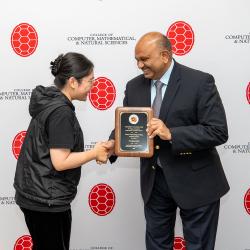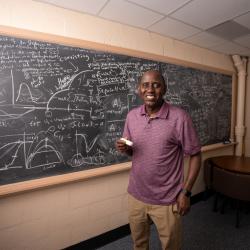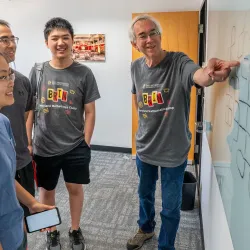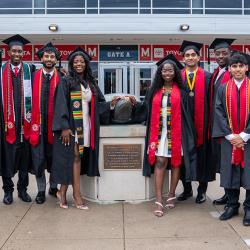Alumna Embraces Student-centered Teaching During the Pandemic
Mathematics graduate taught Algebra II virtually while completing teaching certificate program
Teaching Algebra II virtually to more than 80 high school students in the middle of a pandemic sounded daunting to Lekha Tantry (B.S. ’20, mathematics; M.Ed. ’21) at first, especially because she was simultaneously completing her master’s certification program at the University of Maryland. But because of her experience with Terrapin Teachers, she felt equipped to take on the challenge.
 Starting her freshman year, Tantry took education courses through Terrapin Teachers, a joint program between UMD’s College of Computer, Mathematical, and Natural Sciences and College of Education. Terrapin Teachers provides science and math majors with two pathways to teaching certification—completing a double major in a STEM field plus secondary education with certification in four years or completing a bachelor’s degree in a STEM field and a master’s degree certification program in five years. Under the guidance of highly experienced mentors, students receive early immersive field experiences in local public schools.
Starting her freshman year, Tantry took education courses through Terrapin Teachers, a joint program between UMD’s College of Computer, Mathematical, and Natural Sciences and College of Education. Terrapin Teachers provides science and math majors with two pathways to teaching certification—completing a double major in a STEM field plus secondary education with certification in four years or completing a bachelor’s degree in a STEM field and a master’s degree certification program in five years. Under the guidance of highly experienced mentors, students receive early immersive field experiences in local public schools.
Through Terrapin Teachers, Tantry’s understanding of what mathematics education is all about transformed. Though she excelled in math throughout grade school, her appreciation for the subject took on a whole new life once she took proof-based courses in college that involved critical thinking exercises and problem-solving.
“All through K-12, the math I did was memorizing procedures and doing practice problems,” Tantry explained. “When I took Terrapin Teachers courses, we learned about inquiry-based math through rich questioning and conceptual thinking. I was like, ‘Oh, this is how math is supposed to be taught!’”
For Tantry, teaching her students to ask thoughtful questions while exploring mathematical concepts was a priority, but so was relationship-building. When she began teaching at Paint Branch High School in Burtonsville, Maryland, in fall 2020, she arranged one-on-one time with students virtually to assist them with classwork while also chatting about what was going on in their lives.
“I would listen to my 84 students talk about the stuff they were going through—we were all going through this pandemic together, students and teachers,” Tantry said. “There wasn’t a boundary between school and home, and we really had a window into their home situations.”
With this insight into students’ lives, Tantry decided not to require deadlines for student work. Keeping her students’ life situations at the center of her teaching, she worked to be flexible and understanding, because she knew how overwhelmed her students were feeling during that time.
Exploring issues of equity in education
For Tantry, the mentorship she received through Terrapin Teachers was invaluable. Dana Grosser-Clarkson and Kayla White inspired her and helped shape her teaching style. Both are Terrapin Teachers mathematics master teachers—current or former secondary educators who teach Terrapin Teachers courses and supervise field experiences. For Tantry, receiving constructive feedback from White, who observed some of her Algebra II classes on Zoom, and discussing the issues White also faced with her students proved exceptionally useful as Tantry learned the basics of virtual education on the fly.
“Throughout our Terrapin Teachers courses, we model the student-centered instruction and relationship-building that we expect of our future teachers,” Grosser-Clarkson said. “Through field experiences and other exercises, we push our students to look more closely at their own biases and to develop a critical lens so they can challenge the structural inequities within our public school systems.”
While many schools have made purposeful strides toward educational equity for each student, the education system has perpetuated systemic racism for decades—and most teachers do not receive training on how to identify and actively support solutions to prevent racial injustice and increase educational equity. According to a 2020 Education Week survey, 82% of educators had not received anti-racist training in their preparation programs and 59% do not have the training or resources to support an anti-racist curriculum.
“Lekha entered our program with a lens for advocacy and social justice, so I think Terrapin Teachers aligned with her beliefs and supported her on a journey she had already begun. She makes a deliberate effort to listen, process and join in the conversations on current research about education,” Grosser-Clarkson said. “These conversations and experiences have pushed her understanding of mathematics education and—more broadly—the power structures within schools and our society well beyond that of a novice teacher.”
To learn more about issues of equity in education, Tantry participated in several Alternative Breaks trips—including one to Gaston, North Carolina, that focused on rural education. Before embarking on the trip, Tantry and her peers spent time learning about the community and the challenges of rural education. During winter breaks in 2019 and 2020, she spent five days at KIPP Gaston College Preparatory assisting teachers and working with fifth- through eighth-grade students. The Alternative Breaks participants connected with community members, teachers, parents and administrators to get a more complete understanding of community life and how the school's rural setting influenced students’ learning. This experience ultimately opened Tantry’s mind to what it means to be an active citizen—someone who dedicates his or her life to service.
“Because of Alternative Breaks, I am constantly reading and pursuing professional development opportunities that are social justice-oriented,” Tantry said. “I am constantly reflecting on the things that I am doing in my classroom, trying to be as anti-oppressive and trauma-informed as possible.
Moving on to the next stage of her career
After a year of leading her own classroom virtually, Tantry was selected to be the master’s student speaker at the UMD College of Education’s spring commencement ceremony.
“Lekha was an obvious nomination to represent our program,” Grosser-Clarkson said. “She is among the top 1% of students I’ve seen go through our program at the University of Maryland. Lekha is exceptionally mature and confident for a novice teacher and well-respected by her peers.”
Tantry’s speech reflected the things she learned from her students during her first year of teaching—including very personal insights on how to bring joy into the classroom, how to open up about your struggles, how to build relationships and more.
After commencement, Tantry received a Knowles Teaching Fellowship, an intensive five-year program that offers professional development opportunities and helps teachers develop teaching expertise and leadership in the classroom. Each year, only 35 early-career high school math and science teachers in the U.S. receive this fellowship, valued at over $150,000.
“I tend to have imposter syndrome, constantly doubting my abilities and accomplishments, which I feel is common for women in math and people of color in education,” Tantry said. “Getting the Knowles Fellowship was really validating, and I realized, ‘OK, it’s even clearer to me now that I am meant to be a teacher.’”
Now, she is taking what she learned into her first full-time position teaching Algebra II and Precalculus at Capital City Public Charter School in Washington, D.C. For Tantry, it’s all about making a difference in the classroom.
“I’m focused on how I can have the most impact on the students I teach and the community that I’m in,” Tantry said. “Later on, I can go a step further into leadership working with the system to work against the system.”
###
Media Relations Contact: Katie Bemb, kbemb@umd.edu, 301-405-0215
University of Maryland
College of Computer, Mathematical, and Natural Sciences
2300 Symons Hall
College Park, Md. 20742
www.cmns.umd.edu
@UMDscience
About the College of Computer, Mathematical, and Natural Sciences
The College of Computer, Mathematical, and Natural Sciences at the University of Maryland educates more than 9,000 future scientific leaders in its undergraduate and graduate programs each year. The college's 10 departments and more than a dozen interdisciplinary research centers foster scientific discovery with annual sponsored research funding exceeding $200 million.







